Republican marches
The Republican marches (French: Marches républicaines) were a series of rallies that took place in cities across France on 10–11 January 2015 to honour the victims of the Charlie Hebdo shooting, the Montrouge shooting, and the Porte de Vincennes siege, and also to voice support for freedom of speech.[2]
| Republican marches | |
|---|---|
.jpg) Demonstrators at the Place de la République, Paris, 11 January 2015 | |
| Date | 10 January 2015 – 11 January 2015 |
| Location | |
| Caused by | Charlie Hebdo shooting |
| Goals | Fight against terrorism Freedom of the press Freedom of expression |
| Methods | Rallies, marches |
| Number | |
| 4.4 million in France[1] 100k+ internationally Attended by 40 world leaders | |
French government officials estimated that the rallies were attended by up to 3.7 million people nationwide, making them the largest public rallies in France since 1944, when Paris was liberated from the Nazis at the end of World War II, and also the biggest in French history.[3][4]
In Paris, due to the expected number of people, three streets were planned for the march from Place de la République to Place de la Nation. It was estimated that between 1.5 and 2 million people marched down and nearby Boulevard Voltaire in Paris.[5][6] The Paris marches were attended by 40 world leaders, from both Europe and around the world. The presence during the marches of foreign leaders who are accused of not respecting freedom of speech in their own country has been criticized.[7]
In other cities in France, more than 300,000 rallied in Lyon, about a quarter of the population. More than 100,000 marched the streets of Rennes, Toulouse, Bordeaux, Grenoble, Montpellier and Marseille (within two days). Major rallies took place in Montreal, Brussels, Berlin, Amsterdam and Vienna.[4]
In an interview prior to the Republican Marches, Luz, one of the survivors of the attack, described the show of support for the magazine as "wonderful", but bemoaned a lack of diversity of views in the public discourse following the attacks, which he said served the purposes of politicians, as well the use of symbols, which he characterised as contrary to the values of the magazine. He noted that, following the attacks, The Marseillaise had been sung in public, which his dead colleagues would have scorned.[8] Also speaking prior to the Marches, Willem, another surviving cartoonist, said that a demonstration in support of free expression would be "naturally a good thing", but rejected the support of far-right figures such as Geert Wilders and Marine Le Pen: "We vomit on those who suddenly declare that they are our friends".[9]
Main places
January 10
France
International
.svg.png)




January 11
France
- Paris: 1,500,000–2,000,000
- Lyon: 330,000
- Bordeaux: 140,000
- Rennes: 115,000
- Grenoble: 110,000[11]
- Montpellier: 100,000[12]
- Clermont-Ferrand: 70,000[13]
- Saint-Étienne: 70,000
- Marseille: 65,000
- Brest: 65,000
- Nancy: 50,000
- Strasbourg: 45,000
- Toulon: 45,000
- Angers: 45,000
- Metz: 45,000[14]
- Aix-en-Provence: 40,000
- Perpignan: 40,000
- Tours: 35,000
- Dijon: 35,000
- Caen: 33,000
- Lorient: 30,000
- Nimes: 30,000[15]
- Saint-Brieuc: 30,000
- Reims: 25,000
- Cherbourg: 25,000
- Mulhouse: 25,000
- Quimper: 25,000
- Angouleme: 20,000
- Chambery: 20,000
- Avignon: 20,000[16]
- Vannes: 20,000
- Albi: 16,000
- Alençon: 15,000
- Bastia: 15,000
- Bourg en Bresse: 15,000
- Blois: 15,000
- Carcassonne: 15,000
- La Rochelle: 15,000
- Laval: 15,000
- Mâcon: 15,000
- Perigueux: 15,000
- Poitiers: 15,000
- Saint-Malo: 15,000
- Tarbes: 14,000
- Belfort: 13,000[17]
- Cognac: 11,000
- Charleville-Mézières: 12,000
- Troyes: 12,000
- Ajaccio: 10,000
- Cannes: 10,000
- Bergerac: 10,000
- Tulle: 10,000
- Colmar: 10,000[18][19]
- Ferney Voltaire: 10,000
- Libourne: 10,000
- Dammartin-en-Goële: 10,000
- Narbonne: 10,000
- The Republican marches in France, 11 January 2015
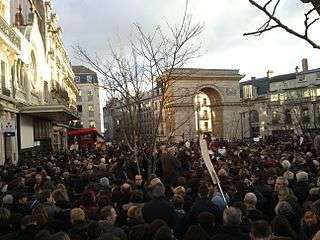
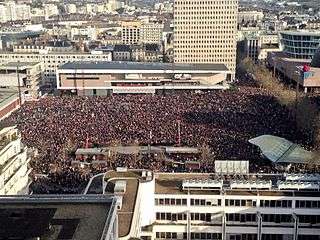
International

.svg.png)
.svg.png)

.svg.png)



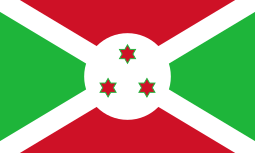
.svg.png)
.svg.png)
.svg.png)
.svg.png)
.svg.png)




























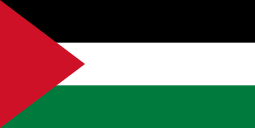


































Notable participants
France
- Pierre Arditi (actor)
- Martine Aubry (Mayor of Lille)
- Jean-Marc Ayrault (former Prime Minister)
- Édouard Balladur (former Prime Minister)
- Claude Bartolone (President of the National Assembly)
- Jean-Michel Baylet (leader of the Radical Party of the Left)
- François Bayrou (leader of the Democratic Movement)
- Tahar Ben Jelloun (Franco-Moroccan writer)
- Laurent Berger (general secretary of the French Democratic Confederation of Labour)
- Dalil Boubakeur (President of the French Council of the Muslim Faith and Rector of the Grand Mosque of Paris)
- Jean-Christophe Cambadélis (Leader of the French Socialist Party)
- Sorj Chalandon (writer)
- Hassen Chalghoumi (Imam of Drancy)
- Emmanuelle Cosse (leader of Europe Ecology – The Greens)
- Édith Cresson (former Prime Minister)
- Roger Cukierman (President of Representative Council of French Jewish Institutions)
- Jean-Louis Debré (President of the Constitutional Council of France)
- Pascal Delannoy (Bishop of Saint-Denis and representative of the French Council of Bishops)
- Bertrand Delanoë (former Mayor of Paris)
- Jean-Paul Delevoye (President of the French Economic and Social Council)
- Harlem Désir (Secretary of State for European Affairs)
- François de Rugy (Co-President of the National Assembly's Ecologist Parliamentary Group)
- Dominique de Villepin (former Prime Minister)
- Nicolas Dupont-Aignan (leader of Arise the Republic)
- François Fillon (former Prime Minister)
- Caroline Fourest (writer, political pundit, former Charlie Hebdo correspondent)
- Pierre Gattaz (CEO of Radiall, President of Medef)
- Laurent Hénart (representing the Radical Party)
- Anne Hidalgo (Mayor of Paris)
- François Hollande (President of France)
- Jean-Paul Huchon (President of the Île-de-France Regional Council)
- Alain Juppé (former Prime Minister)
- Lionel Jospin (former Prime Minister)
- Patrick Karam (President of the Representative Council of French Overseas territories)
- Nathalie Kosciusko-Morizet (representing the Union for a Popular Movement)
- Jean-Christophe Lagarde (leader of Union of Democrats and Independents)
- Stanislas Lalanne (Bishop of Pontoise)
- Jack Lang (President of the Arab World Institute and former Education and Culture minister)
- Gérard Larcher (President of the French Senate)
- Pierre Lemaitre (writer)
- Pierre Lescure (President of the Cannes Film Festival)
- Moché Lewin (Executive Director of the Conference of European Rabbis)
- Stéphane Lissner (Director of the Paris Opera)
- Jean-Claude Mailly (Secretary General of Workers' Force)
- Richard Malka (lawyer for Charlie Hebdo, comic book writer)
- Jean-Luc Mélenchon (leader of the Left Party)
- Joël Mergui (président du Consistoire central israélite de France)
- Frédéric Mitterrand (former Minister of Culture, writer, journalist)
- Hervé Morin (leader of New Centre)
- Mohammed Moussaoui (President of French Council of the Muslim Faith)
- Fleur Pellerin (Minister of Culture and Communication)
- Patrick Pelloux (emergency physician, Charlie Hebdo correspondent)
- Plantu (political cartoonist)
- Jean-Pierre Raffarin (former Prime Minister)
- Jean-Michel Ribes (Director of Théâtre du Rond-Point)
- Michel Rocard (former Prime Minister)
- Ségolène Royal (Minister of Ecology, Sustainable Development and Energy)
- Éric Ruf (Director of Comédie-Française)
- Nicolas Sarkozy (former President of France)
- Michel Sapin (Minister of Finance)
- Éric-Emmanuel Schmitt (writer)
- Christiane Taubira (Minister of Justice)
- Jacques Toubon (Ombudsman of France)
- Philippe Val (journalist, former editor of Charlie Hebdo)
- Manuel Valls (Prime Minister)
International
- Europe





.svg.png)
.svg.png)






















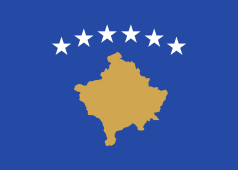






















- North America
.svg.png)


- South America

- Asia









- Africa

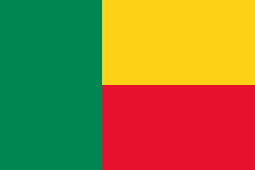
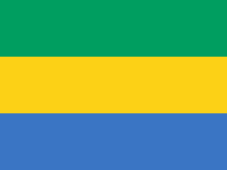
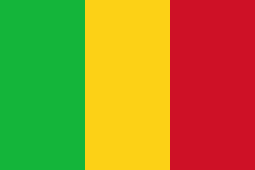
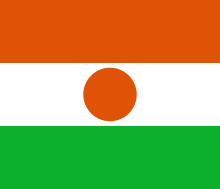

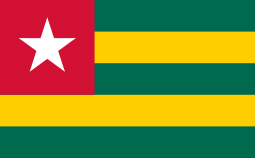

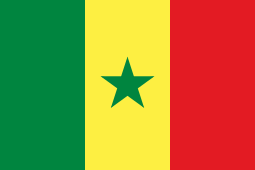

- Institutions
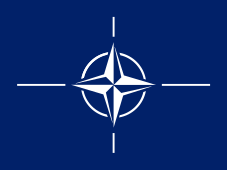

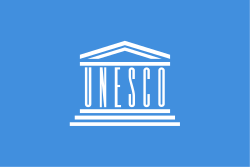





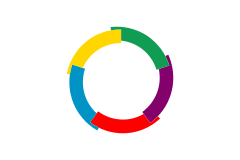


Did not attend


National Front controversy
During the organisation march, a controversy arose when Marine Le Pen was told she was not invited in the marches. This is due to the National Front reputation of divisiveness. François Lamy, one of the organisers, said it is not where the National Front should be; it is not where a political party which, for years, has divided French citizens because of their origin or their religion should be.[62] The President closed this political issue declaring that "every citizen can come...it is not controlled."[63]
References
- Le Parisien, ed. (11 January 2015). "Une marche républicaine historique : plus de 3,7 millions de Français ont défilé". Retrieved 12 January 2015..
- "Paris Terror Suspects Killed in Twin French Police Raids". Bloomberg. 9 January 2014. Retrieved 11 January 2015.
- Hinnant, Lori; Adamson, Thomas (11 January 2015). "Officials: Paris Unity Rally Largest in French History". Associated Press. Archived from the original on 11 January 2015. Retrieved 11 January 2015.
- "Paris attacks: Millions rally for unity in France". BBC News. 12 January 2015. Retrieved 12 January 2015.
- Faiola, Anthony; Witte, Griff (11 January 2015). "Massive crowds join march for solidarity in Paris". The Washington Post. Retrieved 11 January 2015.
- "France attacks: Million-strong unity rally in Paris". BBC News. 11 January 2015. Retrieved 11 January 2015.
- "Marche républicaine : "C'est dur d'être récupéré par des cons"". Le Point.fr.
- "Luz : "Tout le monde nous regarde, on est devenu des symboles"". Les Inrockuptibles. 10 January 2015.
- "'We gaan nog zeker twintig jaar door'". Volkskrant. 10 January 2015.
- "Marche républicaine à Toulouse : 150 000 personnes ont défilé". LaDepeche.fr.
- "110 000 personnes rassemblées à Grenoble". Le Dauphiné. 11 January 2015.
- "Montpellier : près de 100 000 personnes pour la marche citoyenne". MidiLibre.fr.
- Plus de 70 000 personnes mobilisées à Clermont sur La Montagne
- Plus de 45 000 personnes à Metz: du jamais vu! sur Le Républicain Lorrain
- Marche républicaine à Nîmes : les premières images sue Le Midi Libre
- "Avignon : 19 000 personnes à la marche républicaine". MidiLibre.fr.
- "Je suis Charlie : 13.000 personnes dans le rassemblement à Belfort". France Bleu.
- "Sorj Chalandon, Grand prix du roman de l'Académie française". Le Point (in French). 28 October 2011. Retrieved 29 November 2011.
- Le Courrier picard. "COMPIÈGNE 4000 personnes se rassemblent". Le Courrier picard.
- "Unas mil personas se reunieron en la embajada francesa en Buenos Aires". Retrieved 12 January 2015.
- "Rio, São Paulo e Brasília também têm passeatas em solidariedade às vítimas de Paris". O Globo (in Portuguese). Retrieved 12 January 2015.
- "Cerca de 250 pessoas participam de ato no Rio em solidariedade às vítimas de ataques em Paris". CBN (in Portuguese). Retrieved 12 January 2015.
- "Rio e São Paulo também têm passeatas em solidariedade às vítimas de Paris". Mídia Max (in Portuguese). Retrieved 12 January 2015.
- "Je Suis Charlie". Civil Georgia. 8 January 2015. Retrieved 12 January 2015.
- Nicolas Ottersbach. "Gedenkzug für Charlie Hebdo in Bonn: Lichterkette wird zu Lichtermeer – GA-Bonn". Retrieved 12 January 2015.
- "Auch Hannover ist Charlie". HAZ (in German). Retrieved 12 January 2015.
- "Je suis Charlie , "φώναξε" σιωπηλά η Ρόδος". rodosreport.gr (in Greek). Retrieved 12 January 2015.
- Diacono, Tim (11 January 2015). "Justice Minister joins Charlie Hebdo tribute march in Valletta". Malta Today. Retrieved 17 January 2015.
- "Marchan en Guadalajara por atentado contra 'Charlie Hebdo'". Retrieved 14 January 2015.
- "Charlie Hebdo: Jerusalem and Ramallah rally in solidarity". Retrieved 12 January 2015.
- "Rallies held from Gaza to Tokyo in solidarity with France". The Times of Israel. Retrieved 12 January 2015.
- "Sute de clujeni au participat la marșul Je suis Charlie. Manifestări de solidaritate au avut loc și la București. GALERIE FOTO". România curată.
- "Ankara'da Paris protestosu – TRT Türk Haberler". Retrieved 12 January 2015.
- "İstanbul'da gazeteciler Charlie Hebdo için yürüdü". BBC Türkçe. Retrieved 12 January 2015.
- Özgür Gelecek. "İzmir: Je suis Charlie". Retrieved 12 January 2015.
- "BBC News – Cardiff Bay vigil after French terror attacks". BBC News.
- (in Ukrainian) Kharkiv staged a march in memory of victims of the terrorist attack in Paris, Ukrayinska Pravda (10 January 2015)
(in Russian) At the monument to Shevchenko rallied against terrorism in France (photos), SQ (10 January 2015) - "In biting cold Kyivans honor victims of Charlie Hebdo attack". KyivPost.
- Avila Gonzalez, Carlos (12 January 2015). "'Je Suis Charlie' rally at San Francisco City Hall". San Francisco Chronicle. Retrieved 12 January 2015.
- "El mundo marchó para rechazar ataque a Charlie Hebdo".
- "Paris, Marshimi i Paqes" (in Albanian). Prime Minister Office of Albania. 11 January 2015. Retrieved 12 January 2015.
- "Premiér Sobotka a ministr Zaorálek uctili pochodem v Paříži oběti teroristického útoku". Retrieved 12 January 2015.
- Randlaid, Sven (2014-01-11). "Eesti välisminister osales Pariisis ühtsusmarsil" [Estonian Minister of Foreign Affairs participated in Paris in the march of unity]. ERR Uudised (in Estonian). Eesti Rahvusringhääling. Retrieved 2014-01-12.
- "PM Stubb: "Attending Paris march brave for some heads of state"". Yle. 11 January 2015. Retrieved 11 January 2015.
- "Georgia's PM participates in solidarity rally in Paris". Agenda.ge. 11 January 2015. Retrieved 12 January 2015.
- "Enda Kenny joins Paris unity march". Irish Independent. 11 January 2015. Retrieved 11 January 2015.
- "France/Marche républicaine: Lavrov accueilli par Hollande" (in French). Russia: french.ruvr.ru. 2015-01-11.
- "Gojković and Dačić at the Solidarity March in Paris". Voice of Serbia.
- http://svet24.si/clanek/novice/slovenija/54b284f1e481e/pred-shodom-proti-terorizmu-v-parizu-tam-ze-cerar-in-erjavec
- Poroshenko to attend unity rally in Paris on Sunday, Interfax-Ukraine (10 January 2015)
- Huge Show of Solidarity in Paris Against Terrorism, The New York Times
- White House: 'We should have sent someone with a higher profile', CNN
- "Armenian Foreign Minister takes part in Unity March in Paris". Public Radio of Armenia. Retrieved 12 January 2015.
- 中国驻法大使翟隽应邀出席巴黎反恐大游行 (in Chinese). CRI Online. 12 January 2015. Retrieved 12 January 2015.
- "'Paris is today the capital of the world'". Telegraph India. 12 January 2015.
- "Algérie Presse Service". Algérie presse service.
- "Des journaux à côté de la plaque". République Togolaise.
- Robert, Zoë (2015-01-12). "Iceland's PM Criticized for Not Attending Paris March". Iceland Review. Retrieved 2015-01-15.
- Eygló Svala Arnarsdóttir (2015-01-14). "Iceland's PM Regrets Not Attending Paris March". Iceland Review. Retrieved 2015-01-15.
- White House: We should have sent someone to Paris march, USA Today
- America's absence at Paris rally a mistake, Chicago Tribune
- «Il n’y a pas de place» pour le Front national à la «marche républicaine» «Il n’y a pas de place pour une formation politique qui, depuis des années, divise les Français, stigmatise les concitoyens en fonction de leur origine ou de leur religion, ou ne se situe pas dans une démarche de rassemblement des Français» http://www.ledauphine.com/france-monde/2015/01/08/marine-le-pen-denonce-son-exclusion-de-la-marche-republicaine
- "Tous les citoyens peuvent venir (...), il n'y a pas de contrôles" http://www.franceinfo.fr/actu/faits-divers/article/marche-republicaine-fn-tous-les-citoyens-peuvent-venir-la-manifestation-pour-hollande-628859
External links
| Wikinews has related news: |

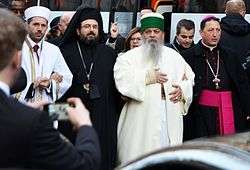
.jpg)